Index relies entirely on the support of donors and readers to do its work.
Help us keep amplifying censored voices today.
[vc_row][vc_column][vc_single_image image=”116596″ img_size=”full” add_caption=”yes”][vc_column_text]A British oil industry whistleblower was detained last night by armed police in Zagreb and held overnight against his will in a psychiatric hospital after British diplomats raised concerns about his mental health.
Jonathan Taylor has been stranded in Croatia since July last year, when he was arrested while entering the country for a holiday with his family. The authorities in Monaco, where he worked for oil company SBM Offshore, have accused him of extortion and requested his extradition to the Principality. He is awaiting a decision from the Croatian Supreme Court this week.
In 2013, Taylor blew the whistle on a multimillion dollar network of bribery payments made by SBM around the world and cooperated with prosecutors in the UK, the US, Brazil and the Netherlands. These investigations resulted in fines against the company to the tune of $827 million and the conviction of two former CEOs of SBM for fraud-related offences. However, Monaco has decided to target the whistleblower rather than those responsible for the bribes.
Freedom of expression organisations, including Index on Censorship, have been lobbying the British government to put pressure on Monaco and Croatia to allow Taylor to return England where his family is now based. Media Freedom Rapid Response partners have demanded an end the extradition proceedings.
Taylor had alerted the British Embassy and the Sofia-based regional consul last Friday about his deteriorating mental health and was asked to put his thoughts into writing. This set off a train of events in Zagreb that Jonathan Taylor relates in his own words here:
“I was met by two armed officers at the roadside to the entrance of the forecourt to my apartment at about 9:15pm last night. I was told I had to wait with them until a psychiatrist arrived in an ambulance. After about 45 minutes we went up to my apartment as it had started raining and the ambulance still hadn’t arrived.
“At about 10:15pm the ambulance drivers arrived and joined the two policemen in my apartment. I was then told I had to accompany them to hospital. I protested stating I had been told a psychiatrist would come to me. I made it clear I was not prepared to leave the apartment. Then four more other armed officers arrived. I again explained I was not happy to go to hospital (see picture top).
“Eventually two of the armed officers manhandled me to the ground causing my head to hit a wall and a resulting headache. I was the cuffed with face against the floor and manhandled out of my apartment into an ambulance where I was strapped into a stretcher. Upon arrival at hospital (no idea where I am) I was dragged out of ambulance and sat on a chair just inside the door to the hospital. I was left there under guard, still handcuffed, for about 30 minutes.
“A lady came to see me (apparently a psychiatrist, but she did not introduce herself) and she asked a few basic questions like ‘why did I arrive with the police?’ and ‘how long had they been following me?’ (!).
“Shortly after this I was taken to a room, still cuffed, where I was strapped to a bed by my feet and legs and my hands. I then refused unidentified tablets and was invited to swallow them whilst someone held a cup of water to my mouth. I refused. I was then forcibly turned and something was injected into my upper thigh. It was now at least 12:30am. At about 6:30am, again against my will, I had a further injection. Another psychiatrist came to see me at about 10:15am and she determined I could go…
“A smiling male nurse has just prodded my arm saying ‘everything will be OK, don’t hate Croatia now!” I have just discovered that I am at the University Hospital Vrapte. What to say?…Where I was looking for help, I got one of the worst twelve-hour experiences of my life.”[/vc_column_text][/vc_column][/vc_row][vc_row][vc_column][three_column_post title=”You may also want to read” category_id=”256″][/vc_column][/vc_row]
[vc_row][vc_column][vc_single_image image=”104453″ img_size=”full” add_caption=”yes”][vc_column_text]Additional reporting by Ada Borowicz, Ilcho Cvetanoski, Lazara Marinković and Zoltán Sipos
The opening volley in a sustained campaign of vilification directed at Serbia‘s independent media was fired by the state-owned weekly Ilustrovana Politika at the end of October, with an article that accused journalists who are critical of the government of being “traitors and collaborators with the enemies of Serbia”.
Two weeks later, Ilustrovana Politika followed up with another piece that accused the veteran journalist Ljiljana Smajlović – who has long been critical of the nationalistic legacy bequeathed on the country by its former leader Slobodan Milosević and co-founded the Commission Investigating the Murders of Journalists in Serbia – of complicity in the 1999 NATO bombing of Belgrade.
In mid-December, Ilustrovana Politika’s campaign of character assassination against Smajlović ratcheted up another level with a garish front page depicting her as a Madonna figure with two naked infants bearing the features of Veran Matić, the chairman of the commission, and US Ambassador to Serbia Kyle Scott.
Smajlović has no doubt over what lies behind this tidal wave of denigration, of which she has become the prime target.
History repeating itself?
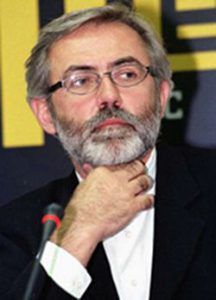
Editor Slavko Ćuruvija was murdered in 1999.
The long-running trial of four ex-members of the Serbian intelligence service accused of the murder of Dnevni Telegraf editor Slavko Ćuruvija – shot dead in April 1999 a few days after the pro-government Politika Ekspres accused him of welcoming the NATO bombardment – is now in its final stages, and Smajlović is convinced that the current campaign against her is designed to influence the judges in the case.
“The attacks come from the same Milosevic-era editors who also targeted my colleague Ćuruvija as a traitor prior to his assassination,” she told Mapping Media Freedom. “What is also sinister is that they are published and printed by the same state-owned media company that targeted Slavko nearly twenty years ago.”
“The clear implication is that I am the same kind of traitor as he was. How will that affect the judges? Will they fear this is not a good time to hold state security chiefs to account?” she added.
While Smajlović admits that Ilustrovana Politika’s denunciation has made her feel insecure, she insists she is less concerned for her own safety than worried about the consequences for the outcome of the Ćuruvija trial. Quoting Marx’s dictum that “History repeats itself, first as tragedy and then as farce”, Smajlović said. “I hope this is the farce part.”
Laying the blame
In Serbia and other central and eastern European countries, the assignment of responsibility for historic causes of resentment and the potential of these to further divide a polarised public often form the background to attacks on independent journalists by their state-approved colleagues.
The thorny topic of Poland’s relations with Germany during the last century recently gave pro-government media in Poland a chance to accuse independent media of being insufficiently patriotic and even of falsifying facts.
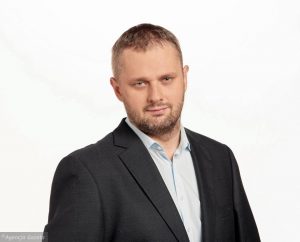
Journalist Bartosz Wieliński was targeted by the head of TVP Info’s news site.
In November, after Bartosz Wieliński, a journalist with the independent daily Gazeta Wyborcza, gave a critical account of a speech made by the Polish ambassador to Berlin at a conference devoted to the centenary of Poland’s independence, the head of the state broadcaster’s news website, TVP Info, accused him of lying and of putting the interests of Germany before those of his own country.
Only a few days before this attack, two media outlets that support Poland’s ruling national-conservative Law and Justice (PiS) party accused the independent US-owned channel TVN of fabricating the evidence on which a report about the resurgence of neo-Nazism in Poland was based.
Since it came to power in 2015, PiS – which has been accused by its critics of tolerating organisations that espouse far-right ideologies – has put pressure on independent media outlets, many of which are foreign-owned, as part of its campaign to “re-polonise” the media, and now appears to be using the public broadcaster and other tame outlets as accessories in this drive.
Willing accomplices
In Hungary, where the government led by Viktor Orbán has succeeded in imposing tight control on all but a few determinedly independent media outlets, a number of loyal publications are available for the purposes of vilification.
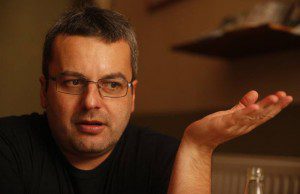
2015 Freedom of Expression Journalism Award winner Tamás Bodoky, founder of Atlatszo.hu
In September, a whole raft of pro-government media outlets vied with each other to depict Tamás Bodoky, the editor-in-chief of the investigative journalism platform Átlátszó and winner of the 2015 Index on Censorship Freedom of Expression Award for Journalism, as a “Soros hireling”. Bodoky became the target of a co-ordinated smear campaign after he posted on Facebook a picture of himself taken in Brussels with Dutch Green MEP Judith Sargentini, whose report on the Fidesz government’s infringement of core EU values had formed the basis for the European parliament’s censure motion against Hungary a few weeks earlier.
Another Hungarian journalist, András Dezső, who works for the independent news website Index.hu, also recently came under attack from pro-government media outlets after a Budapest court let him off with a reprimand over a case in which he was alleged to have made unauthorised use of personal information. In an article published before April’s general election, Dezső had cast doubt on the account of a woman who declared on Hungarian TV that she felt safer in Budapest than in Stockholm because of the lower level of immigration in Hungary. The airing of the interview by the public broadcaster was seen as providing support for Fidesz’s anti-immigration stance and aiding its election victory.
A criminal charge was issued against Dezső for “misuse of personal data”, and after he received what was described in the Hungarian media as “the mildest possible punishment”, two pro-government news websites, 888.hu and Origo.hu, accused him of deliberately propagating fake news and seeking to mislead his readers.
Why do they do it?
What motivates those journalists who smear their colleagues who seek to hold power to account?
There does not appear to be a simple answer to this question. While some may vilify fellow journalists to order purely for financial gain (or because of a desire for job security, government-sponsored media outlets generally being on a more secure financial footing than their independent counterparts), some appear to approach the task with at least a measure of conviction.
Ilcho Cvetanoski, who reports on Bosnia, Croatia, Macedonia and Montenegro for Mapping Media Freedom and has observed many smear campaigns over the years, believes that financial and ideological motivating factors are often inextricably intertwined. He points out that two decades on from the armed conflicts in the region, Balkans societies are still deeply divided along ideological and ethnic lines, and many people still find it extremely difficult to accept the right of others to see things differently. Cvetanoski notes that there are many “true believers” who are genuinely convinced that they have a duty to defend their country from the “other” – a group in which they tend to lump critical journalists along with mercenaries, spies and traitors.
Lazara Marinković, who covers Serbia for Mapping Media Freedom, believes that the main motivation there is a need to be on the winning side and to please those in power. “Often they actually enjoy doing it, either for ideological reasons or because they feel more powerful when they are on the side of the ruling party,” she told Mapping Media Freedom. Marinković noted that the majority of Serbian tabloids and TV stations that conduct smear campaigns against independent journalists are owned by businessmen who have close links to President Aleksandar Vučić’s national conservative Serbian Progressive Party (SNS). Vučić began his political career during the Milosević era, when he served as Minister of Information.
In Poland, the divisions in society and the consequent lack of tolerance in political culture have been blamed for the increasing polarisation of the media. Michal Głowacki, a professor of media studies at Warsaw University, told Mapping Media Freedom that journalists take their cue from politicians in failing to show respect for fellow journalists associated with the “other side”. “They even use the same language as politicians,” Głowacki notes.
This is a view echoed by Hungarian journalist Anita Kőműves, a colleague of Bodoky’s at Átlátszó. Kőműves, however, insists that while journalists who work for independent media outlets strive to uphold the principles of journalistic ethics, the same cannot be said of those employed by pro-government outlets. “Some of those serving the government at propaganda outlets think that the two ‘sides’ of the Hungarian media are equally biased and that they are not acting any differently from their counterparts in the independent media sphere. However, this is not true: pro-government propaganda outlets do not adhere to even the basic rules of journalism,” she told Mapping Media Freedom.[/vc_column_text][vc_raw_html]JTNDaWZyYW1lJTIwd2lkdGglM0QlMjI3MDAlMjIlMjBoZWlnaHQlM0QlMjI0MDAlMjIlMjBzcmMlM0QlMjJodHRwcyUzQSUyRiUyRm1hcHBpbmdtZWRpYWZyZWVkb20udXNoYWhpZGkuaW8lMkZ2aWV3cyUyRm1hcCUyMiUyMGZyYW1lYm9yZGVyJTNEJTIyMCUyMiUyMGFsbG93ZnVsbHNjcmVlbiUzRSUzQyUyRmlmcmFtZSUzRQ==[/vc_raw_html][vc_basic_grid post_type=”post” max_items=”4″ element_width=”6″ grid_id=”vc_gid:1545385969139-cb42990e-b3e2-3″ taxonomies=”9044″][/vc_column][/vc_row]
[vc_row][vc_column][vc_video link=”https://youtu.be/hKK5t6te-GE”][vc_column_text]Novosti weekly is a Serbian-language magazine in Croatia. It is run by journalists who are both Serbs and Croats, and are some of the most highly esteemed reporters in the country.
Although the weekly is fully funded as a Serb minority publication by the Serbian National Council, the paper deals with a whole range topics, not only those directly related to the minority status of Croatian Serbs, but also covering all the political, economic, social and cultural issues that are important for the Croatian society as a whole. 
The paper’s journalists have come under intense pressure in the last year from Croatian nationalists with attacks and death threats that have been sanctioned by ultra-conservative forces in the country.
“As journalists we realise that our professional duty is to write truth, but because of the conditions in which we work, a significant part of our business has become the defence of the right to freedom of expression, without which truth is not possible,” said Novosti Weekly.
This is against a backdrop of a nationalist coalition government led by the conservative Croatian Democratic Union (HDZ), which oversaw the sacking or demotion of 70 public broadcast journalists in the months after it came to power in January 2016.
Novosti irritates nationalists by writing about the things Croatian society is often silent on, for instance, the war crimes committed by the Croatian side during the Balkans war in the 1990s and the role of Croatian forces in the war in Bosnia and Herzegovina. It often uses satirical front covers to make its point.
The weekly also stands up for minorities, including LGBT groups, against the conservative forces of the Catholic Church and war veterans. One of their journalistic campaigns has been to challenge attempts by the far right to rehabilitate the Ustaše, the fascists who were in power in Croatia during World War II.
Novosti prides itself also on classic investigative journalism, which uncovers political and corporate corruption; and they do not shy away from exposing the pressure on editors and journalists from both censorship and self-censorship.
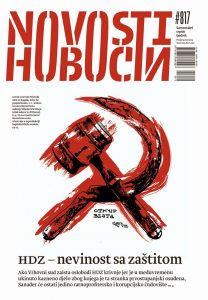
2017 was a year which saw the further rise in Croatia of right-wing extremism and ultra-conservative tendencies. Novosti weekly has been at the forefront of fighting the nationalist purges, becoming a forum for voices of resistance.
At the beginning of December 2016, Novosti broke a story about plans by the government, and veterans associations to install a memorial plaque with the World War II fascist slogan Za dom spremni (Ready for the Homeland) near the site of the former ustaše concentration camp at Jasenovac where more than 83,000 Serbs, Roma and Jews died.
Immediately after the release of the story in Novosti, the far-right political party A-HSP organised a protest under the windows of the magazine’s offices shouting, fascist slogans and anti-Serbian insults.
Some war veterans’ societies filed criminal charges against journalists, and others launched a series of private lawsuits against the publisher of the Novosti.
In August 2017, the extreme right piled on the pressure, accusing Croatian Serbs of setting the fires which burnt down forests in large parts of the Croatian coast during the summer.
They claimed Novosti Weekly had been encouraging the arsonists and Novosti received threats of violence – to shoot journalists and bomb the offices. The editorial team was told they would end up killed like Charlie Hebdo journalists.
The culmination of the summer of threats happened when the A-HSP organised another protest in front of Novosti’s offices and burnt copies of the magazine under the windows of the offices
“We would like to thank you for recognizing our work as well as for putting Novosti Weekly into the international spotlight after reaching the shortlist of the Freedom of Expression Awards,” said Novosti Weekly. “Your recognition means as much as the reactions of all relevant international journalistic organizations that stood in Weekly Novosti’s defense after facing pressure and threats for the work that we do. It’s a strong message of support that speaks volumes not only for all those who burnt out paper, but also to those who tried to ensure our destruction.”
See the full shortlist for Index on Censorship’s Freedom of Expression Awards 2018 here.[/vc_column_text][/vc_column][/vc_row][vc_row full_width=”stretch_row_content” equal_height=”yes” el_class=”text_white” css=”.vc_custom_1490258749071{background-color: #cb3000 !important;}”][vc_column width=”1/2″][vc_custom_heading text=”Support the Index Fellowship.” font_container=”tag:p|font_size:28|text_align:center” use_theme_fonts=”yes” link=”url:https%3A%2F%2Fwww.indexoncensorship.org%2Fsupport-the-freedom-of-expression-awards%2F|||”][vc_column_text]
By donating to the Freedom of Expression Awards you help us support
individuals and groups at the forefront of tackling censorship.
[/vc_column_text][/vc_column][vc_column width=”1/2″ css=”.vc_custom_1521479845471{background-image: url(https://www.indexoncensorship.org/wp-content/uploads/2017/05/2017-awards-fellows-1460×490-2_revised.jpg?id=90090) !important;background-position: center !important;background-repeat: no-repeat !important;background-size: cover !important;}”][/vc_column][/vc_row][vc_row][vc_column][vc_basic_grid post_type=”post” max_items=”4″ element_width=”6″ grid_id=”vc_gid:1523523750750-06e6cb2f-6ea9-6″ taxonomies=”10735″][/vc_column][/vc_row]
[vc_row][vc_column][vc_column_text]
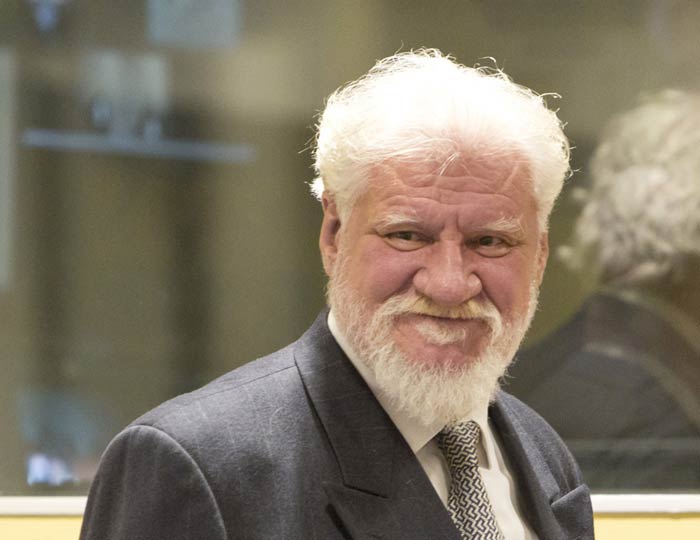
Journalists who referred to Slobodan Praljak, seen here in 2013, and his co-defendants as war criminals after their conviction have been targeted by parties who think the men are heroes. (Photo: UN International Criminal Tribunal for the former Yugoslavia)
Several journalists and news outlets from Croatia and Bosnia and Herzegovina faced death threats and intimidation following their coverage a war crimes trial at the UN International Criminal Tribunal for the former Yugoslavia (ICTY) in The Hague, Netherlands.
In the ruling ending the case, six Bosnian Croat leaders were sentenced on several charges for an ethnic cleansing campaign against Muslim Bosniaks during the 1992-95 Bosnian war.
One of the six defendants was Slobodan Praljak, who committed suicide during the delivery of the court’s verdict by potassium cyanide. Just a seconds before taking the poison, the defendant addressed the court: “Slobodan Praljak is not a war criminal! I reject your judgment with contempt!”
What was supposed to be an easy task, writing a news report from a trial, turned out to be a quite delicate situation. The problem stems from how reporters should refer to the convicted men. War criminals or heroes?
For the conservative and right-wing politicians, currently in power in Croatia, the case is clear. The defendants are heroes, regardless of what court has said. Therefore, Praljak and the other five defendants, in line with the nationalistic narrative, should be praised as heroes, while his suicide is seen as a highly moral act. In line with this, the majority of politicians in the Croatian Parliament held a minute’s silence honouring Praljak. Even the Croatian prime minister, Andrej Plenković, said that the UN court’s verdict was a “deep moral injustice” becoming, as the Guardian reported, the first head of an EU government in support of a convicted war criminal. Later, following the national and international critics, Plenković back-pedalled in his narrative, even though keeping “but” in his argumentation.
In this kind of fraught environment the professional media were supposed to objectively inform the public. For those media workers that used “war criminal” to describe Praljak and other five defendants, what followed was a nightmare. A series of death threats, intimidations, insults and bullying, mainly via social media, were issued against all those outlets and journalists who described Praljak as a sentenced war criminal, or were critically analysing Croatia’s involvement in the 1992-95 Bosnian war.
In just a few days, Croatian news website Index.hr and its journalists received tens of serious death threats, including bomb and napalm threats. As reported by the site, the threats included: “I will fuck your treacherous mother. You are a dead man”; and “there will be time when your 18-year-old daughter will be walking alone around the town.”
Nataša Božić Šarić, editor and host of a political talk show Točka na tjedan (Point for the Week), which is aired on regional private broadcaster N1, received death threats and insults on Facebook after the show. Her question to the guests “should the sentenced be stripped of awarded medals?” was considered as provocation by conservative and right-wing viewers.
The most recent report from the Croatian Journalists’ Association (HND) says that the latest in the long line of intimidated journalists is daily Jutarnji list op-ed Jurica Pavičić. He was threaten for his critical column on the Croatian Parliament’s decision to hold a minute’s silence for the defendants.
The Praljak case resulted in similar rhetoric and threats in neighbouring Bosnia and Herzegovina, where the war crimes were committed. Sanel Kajan, a journalist and correspondent for the regional private broadcaster Al Jazeera Balkans (AJB), received threats from his fellow citizens, Bosnian Croats, for using his voice for the announcement of a special show on the ICTY trial on AJB and for sharing colleagues’ pieces on Facebook.
“I received a ton of threatening messages via Facebook,” Kajan told Index on Censorship. “At the beginning I was just deleting them, but once I realized the gravity, as threats were multiplying every minute, I decided to report the case to the police,” he said. Among the numerous Facebook messages there were death threats like “You won’t be alive for a long time. I promise you this”; and a religious-based ones like “Shame on you, you unbaptised Satan”.
This is not the first time these kind of threats have been “provoked” by objective reporting while nationalistic reports have been praised as true, patriotic journalism. Similar incidents have happened in all post-conflict Balkan states. In recent years, Mapping Media Freedom has documented similar cases in Croatia, Bosnia and Herzegovina, Serbia, Kosovo and the Republic of Macedonia. In all those cases media workers were threatened, intimidated and bullied for questioning nationalistic dogmas.
Zdenko Duka, a well-respected Croatian journalist and former president of HND pointed out that there is plurality in the society which is backed by professional and critical media. “But unfortunately the ruling elite is pushing towards nationalistic rhetoric as a compensation for their incompetence and cowardness,” Duka said. Elaborating on the power dynamics he said that “the Catholic Church and the war veterans” are influencing Croatian politics through the ruling conservative Croatian Democratic Union (HDZ). “Veterans are a privileged group with 2-3 times higher average pensions than the rest of the citizens,” Duka explained.
Croatia’s public and politicians have applied doubles standards to the ICTY verdicts: The court is praised when others are found guilty, but denounced as corrupt when it convicts “heroes”. For years this line of argument has been validated in the public discourse. Srdjan Puhalo, a political analyst from Bosnia and Herzegovina, calls this phenomenon the “moral incompleteness” of the Balkan societies.
“Nowadays is hard to critically analyse the 90s wars. If you write critically you will be called a traitor, and everybody knows what one should do with traitors. Bottom line is that it is you against the system which is backing up the 90s ‘heroes’,” Puhalo said. The only exit out of this vicious circle, according to him, is time. “At the end, only the verdicts will stay throughout history and everything else will be forgotten,” Puhalo concludes.
It is even more important that these kinds of threats against press freedom are not minimised and left unpunished.
“If there will be no concrete action/investigation/outcome out of this then the message will be loud and clear: You are free to intimidate them, and journalists should shut up,” Kajan said.
[/vc_column_text][/vc_column][/vc_row][vc_row][vc_column][vc_custom_heading text=”Mapping Media Freedom” use_theme_fonts=”yes”][vc_separator color=”black”][vc_row_inner][vc_column_inner width=”1/4″][vc_icon icon_fontawesome=”fa fa-times-circle” color=”black” background_style=”rounded” size=”xl” align=”right”][/vc_column_inner][vc_column_inner width=”3/4″][vc_column_text]
Since 24 May 2014, Mapping Media Freedom’s team of correspondents and partners have recorded and verified more than 3,700 violations against journalists and media outlets.
Index campaigns to protect journalists and media freedom. You can help us by submitting reports to Mapping Media Freedom.
[/vc_column_text][/vc_column_inner][/vc_row_inner][vc_separator color=”black”][/vc_column][/vc_row][vc_row][vc_column][vc_custom_heading text=”Don’t lose your voice. Stay informed.” use_theme_fonts=”yes”][vc_separator color=”black”][vc_row_inner][vc_column_inner width=”1/2″][vc_column_text]Index on Censorship is a nonprofit that campaigns for and defends free expression worldwide. We publish work by censored writers and artists, promote debate, and monitor threats to free speech. We believe that everyone should be free to express themselves without fear of harm or persecution – no matter what their views.
Join our mailing list (or follow us on Twitter or Facebook) and we’ll send you our weekly newsletter about our activities defending free speech. We won’t share your personal information with anyone outside Index.[/vc_column_text][/vc_column_inner][vc_column_inner width=”1/2″][gravityform id=”20″ title=”false” description=”false” ajax=”false”][/vc_column_inner][/vc_row_inner][vc_separator color=”black”][/vc_column][/vc_row][vc_row][vc_column][vc_basic_grid post_type=”post” max_items=”10″ style=”load-more” items_per_page=”2″ element_width=”12″ grid_id=”vc_gid:1513934685366-7918602e-7d9f-0″ taxonomies=”6564″][/vc_column][/vc_row]